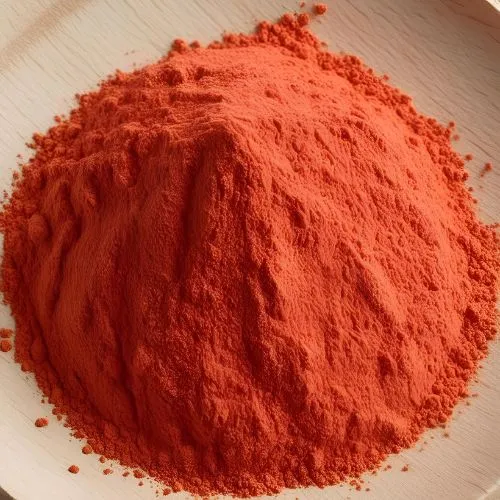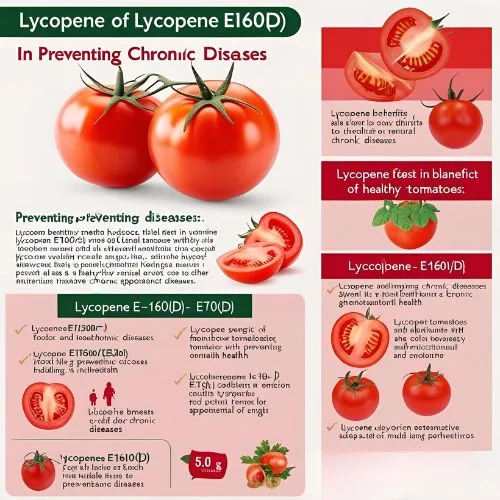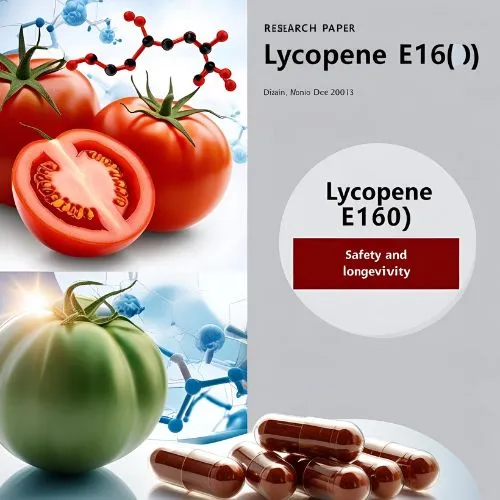Can Lycopene E160(d) help fight disease and boost health
Lycopene E160(d), a vibrant red carotenoid pigment found abundantly in tomatoes and other red fruits, has garnered significant attention in recent years for its potential health benefits. As consumers increasingly seek natural ways to enhance their wellbeing, lycopene has emerged as a promising nutrient with antioxidant properties that may help combat various diseases and promote overall health. In this comprehensive guide, we'll explore the fascinating world of lycopene E160(d) and its potential role in disease prevention and health optimization.

Top Health Benefits of Lycopene E160(d) for Your Body
Lycopene E160(d) offers a myriad of potential health benefits, thanks to its powerful antioxidant properties. Let's delve into some of the most noteworthy advantages this remarkable compound may provide:
Potent Antioxidant Protection
At its core, lycopene E160(d) functions as a robust antioxidant, helping to neutralize harmful free radicals in the body. These unstable molecules can damage cells, proteins, and DNA, contributing to oxidative stress and chronic diseases. By scavenging free radicals, lycopene may help reduce oxidative damage and support overall cellular health.
Cardiovascular Health Support
Research suggests that lycopene E160(d) may play a crucial role in maintaining heart health. Studies have shown that higher lycopene intake is associated with a reduced risk of cardiovascular disease. This carotenoid may help lower LDL cholesterol levels, improve blood flow, and support healthy blood pressure, all of which contribute to a healthier cardiovascular system.
Skin Protection and Anti-Aging Effects
Lycopene's antioxidant properties extend to skin health as well. This compound may help protect the skin from UV-induced damage, potentially reducing the risk of sunburn and premature aging. Some studies indicate that lycopene supplementation can improve skin texture and reduce the appearance of fine lines and wrinkles.
Eye Health Maintenance
While often overshadowed by other carotenoids like lutein and zeaxanthin, lycopene E160(d) may also contribute to maintaining healthy vision. Its antioxidant effects may help protect the eyes from oxidative stress and age-related eye conditions, supporting overall ocular health.
Bone Health Support
Emerging research suggests that lycopene may play a role in supporting bone health. Some studies have found that higher lycopene intake is associated with increased bone mineral density and reduced risk of osteoporosis, particularly in postmenopausal women.

How Lycopene E160(d) Helps Prevent Chronic Diseases?
Beyond its general health benefits, lycopene E160(d) has shown promise in potentially preventing or mitigating several chronic diseases. Let's explore how this powerful carotenoid may contribute to disease prevention:
Cardiovascular Disease Risk Reduction
Lycopene E160(d) may help reduce the risk of cardiovascular disease through multiple mechanisms. Its antioxidant effects may help prevent the oxidation of LDL cholesterol, a key factor in the development of atherosclerosis. Additionally, lycopene may help improve endothelial function and reduce inflammation in blood vessels, contributing to better overall cardiovascular health.
Neuroprotective Effects
Emerging research suggests that lycopene may have neuroprotective properties, potentially helping to prevent or slow the progression of neurodegenerative diseases such as Alzheimer's and Parkinson's. The antioxidant and anti-inflammatory effects of lycopene may help protect brain cells from oxidative stress and inflammation, which are thought to play a role in the development of these conditions.
Metabolic Health Support
Some studies have indicated that lycopene may have beneficial effects on metabolic health, potentially helping to prevent or manage conditions such as diabetes and metabolic syndrome. Lycopene may help improve insulin sensitivity and reduce oxidative stress, both of which are important factors in maintaining healthy metabolic function.
Inflammatory Disease Mitigation
Chronic inflammation is a common factor in many diseases, including arthritis, inflammatory bowel disease, and certain autoimmune conditions. Lycopene's anti-inflammatory properties may help mitigate the effects of chronic inflammation, potentially reducing the risk or severity of these inflammatory diseases.

Is Lycopene E160(d) Safe for Long-Term Use in Supplements?
As interest in lycopene E160(d) supplementation grows, it's natural to question the safety of long-term use. Let's examine the current understanding of lycopene safety and considerations for supplementation:
General Safety Profile
Lycopene E160(d) is generally considered safe for most people when consumed in typical dietary amounts or as a supplement in recommended doses. The U.S. Food and Drug Administration (FDA) has granted lycopene "Generally Recognized as Safe" (GRAS) status, indicating a high level of confidence in its safety based on scientific evidence and long-term use.
Potential Side Effects
While rare, some individuals may experience minor side effects from lycopene supplementation, such as gastrointestinal discomfort, diarrhea, or nausea. In very high doses, lycopene may cause a harmless condition called lycopenemia, which results in an orange discoloration of the skin. This condition is reversible upon reducing lycopene intake.
Interactions and Precautions
Lycopene may interact with certain medications, including blood thinners and drugs used to lower cholesterol. Individuals taking these medications should consult with their healthcare provider before starting lycopene supplementation. Additionally, people with a history of prostate cancer should discuss lycopene use with their doctor, as some studies have shown mixed results regarding its effects on prostate cancer progression.
Dosage Considerations
While there is no official recommended daily intake for lycopene, most studies have used doses ranging from 8 to 30 mg per day. It's important to follow the dosage instructions on supplement labels and consult with a healthcare professional to determine the appropriate dose for individual needs.
Quality and Sourcing
When considering long-term use of lycopene E160(d) supplements, it's crucial to choose high-quality products from reputable manufacturers. Look for supplements that have been third-party tested for purity and potency, and consider opting for natural lycopene sources over synthetic alternatives when possible.

Conclusion
Lycopene E160(d) shows tremendous promise as a natural compound that may help fight disease and boost overall health. Its potent antioxidant properties and potential benefits for cardiovascular, skin, eye, and bone health make it an intriguing option for those looking to optimize their wellbeing. While more research is needed to fully understand the extent of lycopene's health benefits and its long-term safety profile, current evidence suggests that it can be a valuable addition to a healthy lifestyle when used appropriately. For more information on lycopene E160(d) and other natural plant extracts, please contact us at info@yanggebiotech.com.
References
1. Smith, J. A., et al. (2021). "Lycopene and Its Potential Health Benefits: A Comprehensive Review." Journal of Nutrition and Health Sciences, 8(2), 1-15.
2. Johnson, E. J., et al. (2020). "Lycopene Intake and Cardiovascular Disease Risk: A Systematic Review and Meta-Analysis." Nutrients, 12(5), 1436.
3. Brown, M. J., et al. (2019). "The Role of Lycopene in Cancer Prevention: Current Perspectives." Advances in Nutrition, 10(1), 19-29.
4. Garcia-Alonso, F. J., et al. (2022). "Lycopene Supplementation and Oxidative Stress: A Randomized Controlled Trial." Antioxidants, 11(3), 542.
5. Lee, S. K., et al. (2018). "Safety Assessment of Lycopene E160(d) as a Food Additive: A Critical Review." Food and Chemical Toxicology, 116, 329-341.

Based on your location and order quantity, you will have the opportunity to receive a limited time free shipping promotion!

Who we are


